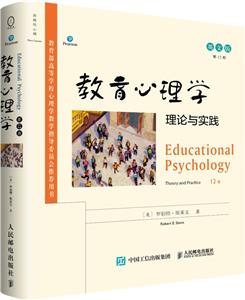-
>
妙相梵容
-
>
基立爾蒙文:蒙文
-
>
我的石頭記
-
>
心靈元氣社
-
>
女性生存戰爭
-
>
縣中的孩子 中國縣域教育生態
-
>
(精)人類的明天(八品)
教育心理學:理論與實踐:theory and practice:英文版 版權信息
- ISBN:9787115567178
- 條形碼:9787115567178 ; 978-7-115-56717-8
- 裝幀:一般膠版紙
- 冊數:暫無
- 重量:暫無
- 所屬分類:>>
教育心理學:理論與實踐:theory and practice:英文版 本書特色
羅伯特·斯萊文的《教育心理學:理論與實踐》在內容體系的構架、事例的科學性、實用性以及可讀性等方面堪稱典范,是一部經受時間檢驗又與時俱進的優質教材。 中國心理學界泰斗張厚粲教授、中國心理學會教育心理學專業委員會委員陳英和教授傾力推薦。 作者羅伯特·斯萊文是美國約翰·霍普金斯大學終身教授、教育研究與改革中心主任,也是“讓所有人都成功”基金會主席,曾多次榮獲美國教育研究會和國家教育委員會頒發的重要獎項,本書是作者數十年教學經驗和研究成果的結晶。 《教育心理學:理論與實踐》(第12版,英文版)秉承“理論知識與實用策略并舉、多元教學理念與方法并存”的宗旨,既有學術專著的科學性和嚴謹性,又具有實用性。它通過大量的真實案例將理論與實踐明確地聯系起來,幫助教師把教育心理學中學到的知識遷移到自己的教學中去,成長為一名“有意識的教師”。 《教育心理學:理論與實踐》(第12版,英文版)具有極強的可讀性,寫作風格讓你在閱讀它時有身臨其境的感覺,似乎能聽到學生的話語,聞到學校食堂午餐的香味。 第12版對全書進行了修訂,增補了新實例,精煉了語言,刪除了過時的或無關緊要的內容,全書引用文獻多達 2000 余篇,其中 75% 出自 2000 年之后,反映了教育心理學和教育實踐領域已經發生的大量變化。
教育心理學:理論與實踐:theory and practice:英文版 內容簡介
《教育心理學 :理論與實踐》(第 12 版,英文版)由美國著名教育心理學家、 約翰·霍普金斯大學的羅伯特·斯萊文教授撰寫,是一部經典的教育心理學教科書,為明日之教師提供必要的基礎知識和實用策略,使之成為有效的教育者。 與市場上那些只講述大量研究、冗長晦澀的教科書和缺乏科學性的膚淺教科書不同,這本教科書兼具科學性和實用性,介紹了教育心理學領域內的主要理論、基本概念、基本規律與方法,通過大量的真實案例將理論與實踐明確地聯系起來,教會讀者如何將教育心理學的理論知識遷移到現實的課堂教學中,成長為一名“有意識的教師”。作者秉承了理論知識與實用策略并舉、多元教學理念與方法并存的特色,每一章都以一幕場景開始,闡釋該章強調的實踐問題,之后的“理論應用于實踐”和“有意識的教師”專欄則提供了進一步的具體策略,以供教師用來改善學生的學習。 本書具有極強的可讀性,在寫作上,作者努力做到讓讀者在閱讀時有身臨其 境的感覺,似乎能聽到學生的話語,聞到學校食堂午餐的香味。 近年來,教育心理學和教育實踐領域已經發生了大量變化,為了反映這些變 化,第 12 版對全書進行了修訂,增補了新實例,精煉了語言,刪除了過時的或 無關緊要的內容,全書引用文獻多達 2000 余篇,其中 75% 出自 2000 年之后。 本書既可作為高等院校教育心理學課程的教材或參考書,供心理學、教育學專業 的教師、學生及研究者使用,也適合各類教育工作者參考閱讀。
教育心理學:理論與實踐:theory and practice:英文版 目錄
CHAPTER ONE
Educational Psychology: A Foundation for Teaching 2
教育心理學:教學的基礎
CHAPTER TWO
Cognitive Development 22
認知發展
CHAPTER THREE
Social, Moral, and Emotional Development 44
社會性、道德和情緒發展
CHAPTER FOUR
Student Diversity 64
學生多元化
CHAPTER FIVE
Behavioral and Social Theories of Learning 96
行為與社會學習理論
CHAPTER SIX
Cognitive Theories of Learning 12
認知學習理論
CHAPTER SEVEN
The Effective Lesson 158
有效的教學
CHAPTER EIGHT
Student-Centered and Constructivist Approaches to Instruction 186
以學生為中心與建構主義取向的教學
CHAPTER NINE
Grouping, Differentiation, and Technology 212
分組、差異化教學與技術
CHAPTER TEN
Motivating Students to Learn 246
激發學生的學習動機
CHAPTER ELEVEN
Effective Learning Environments 270
有效的學習環境
CHAPTER TWELVE
Learners with Exceptionalities 300
特殊學習者
CHAPTER THIRTEEN
Assessing Student Learning 338
評估學生的學習
CHAPTER FOURTEEN
Standardized Tests and Accountability 382
標準化測驗與問責
教育心理學:理論與實踐:theory and practice:英文版 節選
THEORY INTO PRACTICE How to Be an Intelligent Consumer of Educational Psychology Research Let’s say you’re in the market for a new car. Before laying out your hard-earned money, you’ll probably review the findings from various consumer research reports. You may want to know something about how various cars have performed in crash tests, which cars have the best gas mileage, or what the trade-in values of particular models are. Before embarking on this major investment, you want to feel as confident as you can about your decision. If you’ve been in this situation before, you probably remember that all of your research helped you make an informed decision. Now that you are about to enter the profession of teaching, you should apply a similar consumer orientation in your decision making (Andrews, 2014; Fleischman, 2014). As a teacher, you will be called on to make hundreds of decisions each day. Your carbuying decision is influenced by a combination of sound research findings and common sense, and your decisions about teaching and learning should follow this same pattern. Teaching and learning are complex concepts subject to a wide variety of influences, so your knowledge of relevant research will serve to guide you in making informed choices. How can knowing the simple formula research + common sense = effective teaching help you to be a more intelligent consumer of educational psychology research? The following recommendations show how you can put this formula into practice: 1. Be a consumer of relevant research. It’s obvious you can’t apply what you don’t know. As a professional, you should maintain a working knowledge of relevant research. In addition to your course texts, which will be excellent resources for you in the future, you should become familiar with the professional journals in your field. Teacher-oriented journals such as Educational Leadership and Phi Delta Kappan contain easy-to-read summaries of research, for example. Websites such as bestevidence.org summarize program evaluations in a user-friendly way. In addition, check out Annual Editions: Educational Psychology, a yearly publication that reprints articles from various professional journals. Don’t overlook the value of networking with other teachers, face to face or via the Internet. The example of Ellen Mathis and Leah Washington is an excellent illustration of how collaboration can expand your knowledge of what works. 2. Teach intentionally. As stated earlier in this chapter, there is no recipe for the ingredients that make up a commonsense approach to teaching. However, behaviors consistent with being an intentional teacher are about as close as we can get. Intentional teachers are thoughtful. Like Mr. Harris, you should consider multiple perspectives on classroom situations. When you take action, be purposeful and think about why you do what you do. Like other intentional teachers, you can follow your actions with careful reflection, evaluating whether your actions have resulted in the desired outcomes. You probably learned about the “scientific method” sometime during high school. Intentional teachers employ such a method in teaching, formulating a working hypothesis based on observations and background knowledge, collecting data to test the hypothesis, effectively organizing and analyzing the data, drawing sound conclusions based on the data, and taking a course of action based on the conclusions. For many experienced teachers, this cycle becomes automatic and internalized. When applied systematically, these practices can serve to validate research and theory and, as a result, increase your growing professional knowledge base (Schoenfeld, 2014). 3. Share your experiences. When you combine knowledge of research with your professional common sense, you will find yourself engaged in more effective practices. As you and your students experience success, share your findings. Avenues for dissemination are endless. In addition to publishing articles in traditional sources such as professional journals and organizational newsletters, don’t overlook the importance of preparing schoolwide in-service demonstrations, papers for state and national professional conferences, and presentations to school boards. In addition, the Internet offers various newsgroups where teachers engage in ongoing discussions about their work.
教育心理學:理論與實踐:theory and practice:英文版 作者簡介
羅伯特·斯萊文(Robert E. Slavin)是美國約翰·霍普金斯大學教育研究與改革中心主任,也是“讓所有人都成功”基金會主席。他于1975 年在約翰·霍普金斯大學獲社會關系學博士學位,迄今撰寫了300 余篇關于合作學習、綜合學校改革、能力分組、學校和班級組織、廢除種族歧視、納入主流、研究評論以及循證改革等方面的論文和書籍章節。斯萊文博士的著作(包括與他人合著)多達20 部,包括《合作學習》《學校和班級組織》《針對高危學生的有效方案》《預防早期的學業失敗》《200萬兒童:讓所有人都成功》《拉丁裔學生的有效項目》《問責制時代的教育研究》。1985 年,斯萊文博士因應用項目研究而榮獲了美國教育研究會(AERA)頒發的雷蒙德·卡特爾早期職業獎;1988 年,他在美國教育研究會主辦的學術期刊上獲得了帕爾默·約翰遜優秀論文獎;1994 年獲得查爾斯·達納獎,1998 年獲得美國國家教育委員會頒發的詹姆斯·布賴恩特·科南特獎,2000 年獲得州首席教育官員聯合會頒發的杰出貢獻獎;2008年他在美國教育研究會主辦的雜志上再次獲得帕爾默·約翰遜優秀論文獎,2009 年獲得AERA 研究綜述獎,2010年成為AERA會員。
- >
隨園食單
- >
我與地壇
- >
月亮虎
- >
莉莉和章魚
- >
伯納黛特,你要去哪(2021新版)
- >
苦雨齋序跋文-周作人自編集
- >
伊索寓言-世界文學名著典藏-全譯本
- >
名家帶你讀魯迅:朝花夕拾
















